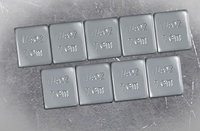New York Gets the Lead Out
 |
LA VERGNE, TN--March 31, 2011: Beginning April 1, 2011, the sale and installation of lead wheel weights will be banned in the state of New York, continuing a nationwide trend with a positive impact on the environment.
“Starting tomorrow, New Yorkers will be exposed to less airborne lead when my law prohibiting the use or sale of lead wheel weights takes effect”
Most people will go green without ever seeing how they're doing it wheel weights typically weigh only 1.25 ounces, are less than 2 inches in length, and are affixed to the inside of or on a vehicle's wheel, out of sight, in order to balance the tire and wheel assembly. Despite the anonymity of the weights, the impact of the ban in New York will be enormous, the typical vehicle has eight to 10 wheel weights on it; with more than 11 million vehicles on the road in the Empire State, that equates to approximately 100 million weights at any one time. New York becomes the seventh state to ban lead weights, joining California, Illinois, Maine, Minnesota, Vermont and Washington.
Kevin Keefe, vice president of marketing for Hennessy Industries, which has led the wheel weight industry's transition away from lead and developed a popular line of BADA brand steel wheel weights as an alternative to lead, applauded the move.
"It's not often that every single citizen of a state participates in an activity that is good for the environment; but from here on out, any time New Yorkers have their wheels balanced, they'll be doing it in a more environmentally responsible way than ever before, and odds are they won't even realize it," said Keefe.
Lead, one of 31 priority chemicals targeted for reduction by the EPA, has long been the material of choice for wheel weights. In recent years, however, virtually all worldwide automobile manufacturers have voluntarily moved away from lead weights as part of vehicles' original equipment, and major tire retailers such as Wal-Mart, Costco and Bridgestone/Firestone have discontinued the use of lead weights. Some large retailers and many smaller, independent shops continue to install lead weights in the aftermarket, however, and with no nationwide ban on lead weights, states have taken up the issue on their own.
Those who violate the ban in New York can face stiff penalties, depending on circumstances, including fines of up to $1,000 per violation (and an additional $1,000 per day the violation occurs).
"Starting tomorrow, New Yorkers will be exposed to less airborne lead when my law prohibiting the use or sale of lead wheel weights takes effect," said New York Assemblymember Linda B. Rosenthal. "We are all well-aware of the dangers of lead, both to human health and the environment. What people may not realize is that many tiny wheel weights, which are clipped on to the wheel's rim to help keep the wheels balanced, are made mostly of lead. When these weights come loose, they are crushed by other vehicles, and are responsible for spreading lead dust into the air and water. Preventing the sale or use of these lead wheel weights, which easily can and are already being made of steel, will have a significant impact on people's health and the environment."
Steel has emerged as the most popular alternative to lead, besting zinc, which, though a less harmful substance than lead, is considered a secondary water contaminant. Steel presents no such environmental concerns and is much more convenient to recycle. At its BADA plant in Bowling Green, Ky., Hennessy Industries has made major investments to retrofit its wheel weight plant to manufacture steel weights. The company has seen significant growth in its steel weight business since 2005, and has launched websites to educate consumers Green Wheel Balance and its own clients (Steel Wheel Weights) on the issue.


